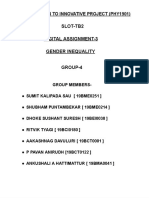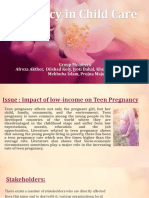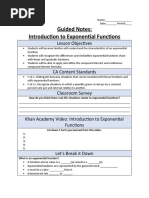Tanzania: Rapid
Tanzania: Rapid
Uploaded by
FuturesGroup1Copyright:
Available Formats
Tanzania: Rapid
Tanzania: Rapid
Uploaded by
FuturesGroup1Original Title
Copyright
Available Formats
Share this document
Did you find this document useful?
Is this content inappropriate?
Copyright:
Available Formats
Tanzania: Rapid
Tanzania: Rapid
Uploaded by
FuturesGroup1Copyright:
Available Formats
RAPID
Tanzania
Enabling Women and Girls to Advance
Three in five Tanzanian women live in absolute poverty, with limited access to education, credit, and other opportunities for self-advancement.1 Their options in life are constrained not only by poverty but also by social norms that devalue females and discriminatory laws that limit their ability to own and inherit property, build a business, and control their own money. Many women and girls are unable to make independent decisions about life choices such as attending school, acquiring job skills, protecting their health, and postponing marriage and parenthood until they are ready. Ensuring that females have the same opportunities as males helps everyone to progress. Investing in programs for girls and women pays off in greater productivity and prosperity for society. Two key actions can improve the well-being of women and girls: 1. Protect women and girls from violence 2. Discourage early marriage Thirty percent of the married women who had experienced one or both forms of violence in the past 12 months said that it occurred often.5 Cultural and gender norms condone violence. Many men, women, and communities accept gender-based violence as a normal part of life. Given these attitudes, those who commit violence are seldom punished. Women and girls rarely report gender-based violence to authorities or seek other kinds of treatment or support. Violence directly affects the physical and psychological health of women and girls. Health outcomes include unintended pregnancy, maternal mortality, death, sexually-transmitted infections, depression and anxiety, poor self-esteem, posttraumatic stress disorder, and suicide.6
WomEn
Protect Women and Girls from Violence
Nearly half (45%) of all Tanzanian women ages 1549 report that they have ever experienced physical or sexual violence, or both, according to a 2010 national survey.2 This violence often starts at a young age. One in four girls ages 1517 have experienced either or both forms of violence.3 Violence by an intimate partner occurs frequently. More than two in three women who ever experienced physical and/or sexual violence said that the perpetrator was their husband or partner.4
Photos on this page: David Dennis (top) and Bill & Melinda Gates Foundations (bottom)
November 2012
RAPID WomEn Tanzania: Enabling Women and Girls to Advance
Discourage Early marriage
Among teenage girls ages 1519, nearly one in five (18%) are already married.7 Early marriage, which is often followed by early childbearing, often marks the end of a girls education and her opportunities to acquire job-related skills that could improve her life situation. The Law of Marriage Act of 1971 allows girls to marry at age 15 with parental consent and allows exceptions for girls age 14 under justifiable circumstances, whereas boys cannot marry before age 18. Raising the legal age of marriage for girls to 18 would help to create public awareness of the issue and would protect girls from forced marriage.
What Can Be Done
Government agencies should take the following actions to improve womens and girls status:
Allocate funds to implement women-centred programmes Implement community programmes to prevent violence against females, punish perpetrators, and offer medical and psychological support to victims of violence Empower women to participate in decisions regarding their own health and well-being Protect girls from abuse and promote their physical and mental development Raise the legal age of marriage for girls to 18 by amending the Law of Marriage Act Expand in-school education on sexual and reproductive health and scale up training for teachers Integrate sexual and reproductive health education in the teacher training curriculum Increase womens access to opportunities for income generation and credit, especially in rural areas Change laws that discriminate against women and girls
Supportive Policies
The Government of Tanzania has made the advancement of women and girls a priority, evident by the appointment of gender focal points in each ministry and the enactment of several policies and plans:
National Plan of Action for the Prevention and Eradication of Violence Against Women and Children (20102015) Policy Guidelines towards Response and Prevention of Gender-based Violence National Guidelines for the Management of Gender-based Violence Tanzania Police Female Network (to respond to violence against women)
These key actions would help women and girls to advance, which would benefit families and communities throughout Tanzania.
1 2
Government of Tanzania. 2012. Gender. Accessed on August 28, 2012 at: http://www.tanzania.go.tz/gender.html.
Tanzania National Bureau of Statistics (NBS) and ICF Macro. 2011. Tanzania Demographic and Health Survey 2010. Dar es Salaam, Tanzania: NBS and ICF Macro.
3, 4, 5 6
NBS and ICF Macro, 2011.
World Health Organization. 2005. Multi-Country Study on Womens Health and Domestic Violence Against Women. Accessed on August 28, 2012 at: http://www.who.int/gender/violence/who_multicountry_study/summary_report/summary_report_English2.pdf. NBS and ICF Macro, 2011.
WAMA thanks the David and Lucile Packard Foundation for its generous support.
Wanawake Na Maendeleo (WAMA) Foundation is a nongovernmental organisation founded by the Tanzanian First Lady, Mama Salma Kikwete, in 2006. Its goal is to improve the life standard of women and children by promoting access to education, health services, and capacity building for economic empowerment. Major programme areas are girls education, womens empowerment, health promotion and advocacy, and orphans and vulnerable children.
WAMA Foundation P.O. Box 10641 Dar es Salaam, Tanzania Tel: 255 22 2126516 Fax: 255 22 2121916 Email: info@wamafoundation.or.tz http://www.wamafoundation.or.tz
You might also like
- Gender-Based Violence Is A Barrier To Achieving Development AgendaNo ratings yetGender-Based Violence Is A Barrier To Achieving Development Agenda23 pages
- Slot-Tb2 Digital Assignment-3 Gender Inequality: Introduction To Innovative Project (Phy1901)No ratings yetSlot-Tb2 Digital Assignment-3 Gender Inequality: Introduction To Innovative Project (Phy1901)13 pages
- Address by Cyril Ramaphosa at The 2018 Gender-Based Violence Presidential SummitNo ratings yetAddress by Cyril Ramaphosa at The 2018 Gender-Based Violence Presidential Summit7 pages
- Chetana-A Project Report On Women Safety and Empowerment.No ratings yetChetana-A Project Report On Women Safety and Empowerment.25 pages
- Poverty and Violence Against Women and ChildrenNo ratings yetPoverty and Violence Against Women and Children3 pages
- An Assault On Our Future: The Impact of Violence On Young People and Their Relationships100% (1)An Assault On Our Future: The Impact of Violence On Young People and Their Relationships55 pages
- AIDSTAR-One Case Study - Earning Their Way To Healthier Lives: Women First in MozambiqueNo ratings yetAIDSTAR-One Case Study - Earning Their Way To Healthier Lives: Women First in Mozambique12 pages
- RSTV Summary THE BIG PICTURE VIOLENCE AGAINST WOMENNo ratings yetRSTV Summary THE BIG PICTURE VIOLENCE AGAINST WOMEN5 pages
- Violence Against Women in The PhilippinesNo ratings yetViolence Against Women in The Philippines6 pages
- 17-Prevention and Impact of Pre-Marital Pregnancy and Sexually Transmitted Diseases-06-11-2024No ratings yet17-Prevention and Impact of Pre-Marital Pregnancy and Sexually Transmitted Diseases-06-11-20242 pages
- Gender Based Violence Is A Profound and Widespread Problem in South Africa, Impacting Almost Every Aspect of LifeNo ratings yetGender Based Violence Is A Profound and Widespread Problem in South Africa, Impacting Almost Every Aspect of Life2 pages
- Analysis of The Uganda Gender Policy of 2007No ratings yetAnalysis of The Uganda Gender Policy of 20078 pages
- Atrocities Against Girl Students: Analysing Newspaper ReportsNo ratings yetAtrocities Against Girl Students: Analysing Newspaper Reports13 pages
- Sex Education Does Not Lead To PromiscuityNo ratings yetSex Education Does Not Lead To Promiscuity4 pages
- Choose A Particular Sector or Topic Discussed Above That May Interest YouNo ratings yetChoose A Particular Sector or Topic Discussed Above That May Interest You7 pages
- Article On DOMESTIC VIOLENCE DURING LOCKDOWN - DocxxxxNo ratings yetArticle On DOMESTIC VIOLENCE DURING LOCKDOWN - Docxxxx5 pages
- Correlation Between Unemployment and Health: A Comprehensive AnalysisNo ratings yetCorrelation Between Unemployment and Health: A Comprehensive Analysis4 pages
- AIDSTAR-One Case Study CARE's STEP Program in VietnamNo ratings yetAIDSTAR-One Case Study CARE's STEP Program in Vietnam12 pages
- _Policy Brief_EDHS 2016 VAW Analysis_1 Oct 2019_cleanedNo ratings yet_Policy Brief_EDHS 2016 VAW Analysis_1 Oct 2019_cleaned20 pages
- 8 Millennium Development Goals - Group 2No ratings yet8 Millennium Development Goals - Group 227 pages
- Childhood Sexual Abuse Believing Victims and Supporting Survivors: Why Do We Do so Little When We Know so Much?From EverandChildhood Sexual Abuse Believing Victims and Supporting Survivors: Why Do We Do so Little When We Know so Much?No ratings yet
- Combination HIV Prevention: Tailoring Programs To Stop TransmissionNo ratings yetCombination HIV Prevention: Tailoring Programs To Stop Transmission2 pages
- Efficiency and Effectiveness (E ) : Empowering Countries To Get The Most Impact From Their Health ProgramsNo ratings yetEfficiency and Effectiveness (E ) : Empowering Countries To Get The Most Impact From Their Health Programs2 pages
- Improving Maternal & Newborn Health & Nutrition in IndonesiaNo ratings yetImproving Maternal & Newborn Health & Nutrition in Indonesia2 pages
- Gender, Policy, and Governance: Promoting Gender Equality For Improved Health OutcomesNo ratings yetGender, Policy, and Governance: Promoting Gender Equality For Improved Health Outcomes2 pages
- Voluntary Family Planning Programs That Respect, Protect, and Fulfill Human RightsNo ratings yetVoluntary Family Planning Programs That Respect, Protect, and Fulfill Human Rights58 pages
- Improving Maternal & Newborn Health & Nutrition in IndonesiaNo ratings yetImproving Maternal & Newborn Health & Nutrition in Indonesia2 pages
- Promoting Health Equity: Involving The Poor To Improve ServicesNo ratings yetPromoting Health Equity: Involving The Poor To Improve Services2 pages
- Combination HIV Prevention: Tailoring Programs To Stop TransmissionNo ratings yetCombination HIV Prevention: Tailoring Programs To Stop Transmission2 pages
- Community Led Crisis Response Systems: A Handbook Based On The Experience of The Avahan India Aids InitiativeNo ratings yetCommunity Led Crisis Response Systems: A Handbook Based On The Experience of The Avahan India Aids Initiative146 pages
- Futures Group Service Overview: Program AreasNo ratings yetFutures Group Service Overview: Program Areas2 pages
- From Isolation To Solidarity: How Community Mobilization Underpins HIV Prevention in The Avahan India AIDS InitiativeNo ratings yetFrom Isolation To Solidarity: How Community Mobilization Underpins HIV Prevention in The Avahan India AIDS Initiative60 pages
- Repositioning Family Planning in Mali: A BaselineNo ratings yetRepositioning Family Planning in Mali: A Baseline50 pages
- Health Informatics: Integrated Data-Driven DecisionmakingNo ratings yetHealth Informatics: Integrated Data-Driven Decisionmaking2 pages
- Repositioning Family Planning in Burkina Faso: A BaselineNo ratings yetRepositioning Family Planning in Burkina Faso: A Baseline50 pages
- Repositioning Family Planning in Guinea: A BaselineNo ratings yetRepositioning Family Planning in Guinea: A Baseline44 pages
- Repositioning Family Planning in Mauritania: A BaselineNo ratings yetRepositioning Family Planning in Mauritania: A Baseline50 pages
- Improving The Use of Health Data For Health System StrengtheningNo ratings yetImproving The Use of Health Data For Health System Strengthening10 pages
- Improving Access To Family Planning Can Promote Food Security in The Face of Ethiopia's Changing ClimateNo ratings yetImproving Access To Family Planning Can Promote Food Security in The Face of Ethiopia's Changing Climate4 pages
- Making A Difference in Gender-Based Violence: Futures Group OfferingsNo ratings yetMaking A Difference in Gender-Based Violence: Futures Group Offerings2 pages
- Gender, Policy, and Governance: Promoting Gender Equality For Improved Health OutcomesNo ratings yetGender, Policy, and Governance: Promoting Gender Equality For Improved Health Outcomes2 pages
- Improving Access To Family Planning Can Promote Food Security in A Changing ClimateNo ratings yetImproving Access To Family Planning Can Promote Food Security in A Changing Climate4 pages
- India Habitat Centre: Written Answers To QuestionsNo ratings yetIndia Habitat Centre: Written Answers To Questions6 pages
- Caterpillar Lift Truck Npp20m Operation Maintenance ManualNo ratings yetCaterpillar Lift Truck Npp20m Operation Maintenance Manual22 pages
- Motion Reschedule Deposition of Raul HasbunNo ratings yetMotion Reschedule Deposition of Raul Hasbun6 pages
- KA10102 Civil Engineering Materials BK2015 PDFNo ratings yetKA10102 Civil Engineering Materials BK2015 PDF3 pages
- Nutritional Biochemistry: Vitamins Dr. Bidhan Chandra Koner100% (1)Nutritional Biochemistry: Vitamins Dr. Bidhan Chandra Koner50 pages
- What Is Art?: Definition of Arts According To Well-Known Philosophers and ArtistsNo ratings yetWhat Is Art?: Definition of Arts According To Well-Known Philosophers and Artists9 pages
- ANURAG KHAIWAL - FinalProjectReport - Anurag KhaiwalNo ratings yetANURAG KHAIWAL - FinalProjectReport - Anurag Khaiwal13 pages
- Culture Inspired 1 Social Situations PDFNo ratings yetCulture Inspired 1 Social Situations PDF2 pages
- Ministry of Energy (Petroleum Division) Geological Survey of PakistanNo ratings yetMinistry of Energy (Petroleum Division) Geological Survey of Pakistan3 pages
- If If: Objective First Student's Book English Vocabulary Profile100% (1)If If: Objective First Student's Book English Vocabulary Profile13 pages
- The Paper English Language Application LetterNo ratings yetThe Paper English Language Application Letter8 pages
- Exploring The Business or Startup Idea Subject:: AssignmentNo ratings yetExploring The Business or Startup Idea Subject:: Assignment3 pages















































































































